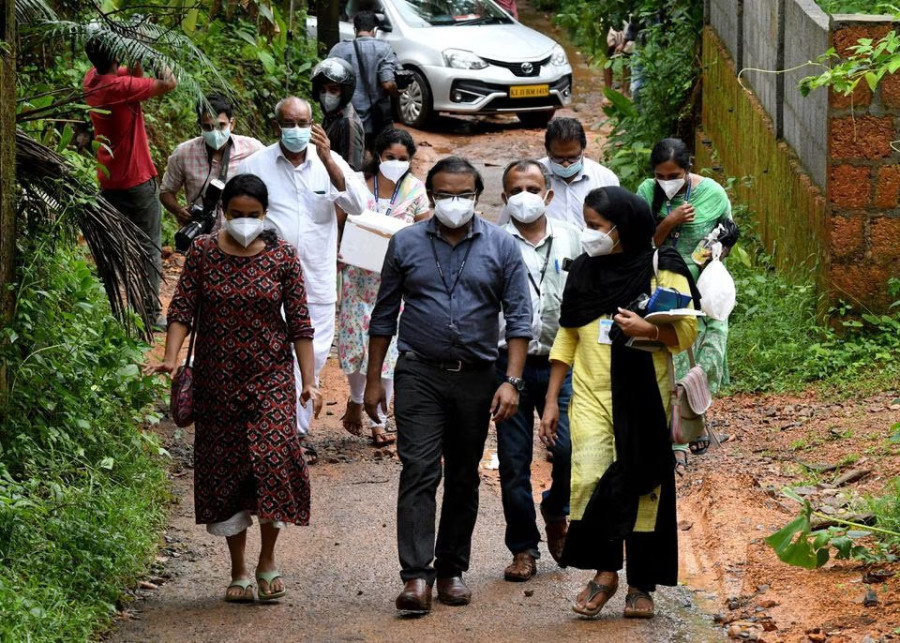Arjun Poudel
 Virus found in India’s Kerala now is Bangladeshi variant, less infectious but more lethal.
Virus found in India’s Kerala now is Bangladeshi variant, less infectious but more lethal.Members of a medical team from Kozhikode Medical College carry areca nut and guava fruit samples to conduct tests for Nipah virus in Maruthonkara village in Kozhikode district, Kerala, India.
Amid the risk of an outbreak of the Nipah virus that killed at least two people in India recently, the health authorities in Nepal said they are monitoring the situation.
Officials at the Epidemiology and Disease Control Division said they have asked the agencies concerned to step up their disease surveillance and analyse the risks.
“We will take a decision as per the level of risk,” said Dr Hemanta Ojha, chief of the Zoonotic and Other Communicable Disease Control Section.
Nipah is a zoonotic virus, which is transmitted from animals to humans. It is among the deadlier viruses with up to 75 percent mortality rate in humans, according to the World Health Organisation.
Transmission generally occurs when people come in direct contact with infected animals—pigs, fruit bats or through consumption of contaminated foods and meat of infected animals, according to health officials.
Cases of human-to-human transmission of the virus have also been reported in many places, including India, in families and in caregivers to the infected people.
Health authorities in India have confirmed at least two deaths and three other cases of the viral infection, including in one child, in the southern Indian state of Kerala since August 30.
Schools, offices and public transport have been shut down in parts of the state following confirmation of the virus outbreak.
This is the fourth outbreak of Nipah virus in Kerala since 2018, according to media reports. The Nipah strain found in Kerala this time is the Bangladesh variant, which is less infectious but has a high mortality rate. This particular strain spreads from one human to another.
“We have the capacity to test the Nipah virus within the country and have procured the testing kits,” said Ojha. “We will also alert hospitals if the risk increases.”
Doctors say Nepal is at a risk of an outbreak of the Nipah virus, as fruit bats, which are the primary hosts of the virus, might be present in the country.
The Nipah virus was first detected in 1999, after farmers and others who came in close contact with infected pigs in Malaysia and Singapore developed severe respiratory problems and inflammation in the brain.
According to the US Centers for Disease Control and Prevention, nearly 300 people were diagnosed with the disease then, and more than 100 of them died.
Experts said the authorities should take the issue seriously as the virus is far deadlier than the coronavirus, with up to 75 percent death rate in humans.
They say the fruit bats from India, which carry the Nipah virus, can easily enter Nepal due to the proximity and similar environment. Moreover, there is always a high chance of a disease seen in India entering Nepal due to the free movement of people between the two countries, doctors say.
The World Health Organisation, meanwhile, has said that although the virus has caused only a few known outbreaks in Asia, it infects a wide range of animals and causes severe disease and death in people, making it a public health concern.
Doctors say most symptoms of the Nipah virus match those of the coronavirus and this increases the chances of misdiagnosis. They say the incubation period of Nipah infection is 4 to 14 days and its symptoms include fever, headache, convulsions, and respiratory and neurological problems.
The Health Ministry said that at present there is no treatment for the Nipah virus. Health workers only provide symptomatic treatments.
No comments:
Post a Comment